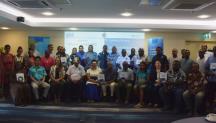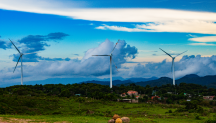

-
-
IRENA (2021), Renewable Readiness Assessment: The Republic of Tunisia, International Renewable Energy Agency, Abu Dhabi.
Copied
/-/media/Files/IRENA/Agency/Publication/2021/Jun/IRENA_RRA_Tunisia-2021.pdf?rev=4e8e73f31aaf47eb99e58543dc24b43d
Copied
Renewables Readiness Assessment: The Republic of Tunisia
Newsletter
Tunisia has experienced growing dependence on imported fossil fuels over the past two decades, largely due to increasing energy consumption across its national economy and falling domestic hydrocarbon production. The country’s electricity generation mix is dominated by natural gas, production of which has stagnated in recent years, leaving Tunisia increasingly vulnerable to supply disruptions and volatile energy prices.
The report is also available in French (Français).
The report's executive summary is also available in Arabic (عربي), English and French (Français).
For these reasons, energy efficiency and renewables have received increasing attention as the country embarks on an energy transition process as part of its sustainable economic and social development strategy. Key goals include reducing primary energy demand by 30% compared to a business-as-usual scenario, and increasing the contribution of renewables in electricity production to 30% by 2030.
Prepared in collaboration with the National Agency for Energy Conservation (ANME) and the Ministry of Industry, Energy and Mines, this assessment identifies the main challenges faced by Tunisia in meeting these goals. It identifies various existing barriers to the development of renewable energy in the country and proposes a number of corresponding solutions to assist Tunisia’s energy transition. These include:
- The need for a renewable energy planning and scheduling framework to govern the long-term development of the necessary infrastructure to support variable renewable energy (VRE) sources such as solar and wind power.
- Enhanced renewable resource assessment capabilities, including through the identification of promising renewable energy development zones throughout the country.
- Simplified procurement procedures for power grid development.
- The establishment of an independent electric power regulator.
- Clarity regarding institutional roles in the context of the energy transition and a strengthening of relevant human resource capabilities.
- Activation and funding of Tunisia’s Energy Transition Fund (FTE) – the principal national financing tool for energy efficiency and renewable energy activities.
- The establishment of a dedicated financing mechanism for solar water pumping.
- Greater involvement by local banks in financing renewable energy projects, and bilateral cooperation to unlock further foreign investment in the sector.




